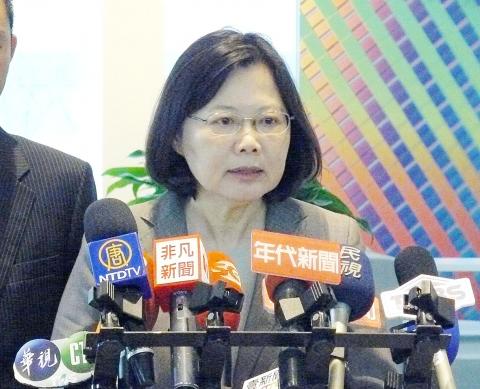In response to President Ma Ying-jeou’s (馬英九) request that she elaborate on her cross-strait agenda, Democratic Progressive Party (DPP) Chairperson Tsai Ing-wen (蔡英文) yesterday said that she has explained it well already and criticized Ma for not knowing about the public’s real concerns.
“I explained clearly on April 15 that ‘maintaining the status quo’ refers to maintaining peace across the Taiwan Strait and maintaining stable developments in cross-strait relations,” Tsai said at the DPP’s headquarters in Taipei on the sidelines of the party’s Central Executive Committee meeting.
“There is a newly released opinion poll showing that as much as 74 percent of the public agrees with such an idea — showing that what I have said is in accordance with public expectations,” she said.

Photo: CNA
In a speech on cross-strait development yesterday, Ma said that Tsai, as the DPP’s candidate for next year’s presidential election, has a duty to clearly define what she means by the “status quo” and her plans to maintain it.
In response to Ma’s comment that she is trying to avoid the “one China” issue, Tsai said that there was no need for Ma to repeat the same thing, because “that is not something that the public cares about,” and that speaking about “one China” would not help to resolve the real problems that Taiwan faces.
“If what he says is ‘useful,’ there would not be so many people upset with his government,” Tsai said.
Tsai said she met yesterday with Taiwan Semiconductor Manufacturing Co (TSMC) chairman Morris Chang (張忠謀) to discuss the future of Taiwan’s industries, labor rights, environmental issues, the gap between poor and rich, and the differences between southern and northern Taiwan.
“I think these are the issues that the people are really concerned about,” the DPP chairperson said.
“It is rather disappointing that, after being the president for seven years, Ma still does not know what the public really cares about. I do not understand why he had to go to the Mainland Affairs Council to say what he said,” Tsai said.
“These are things that he has repeatedly said in the past. If they were useful and acceptable to the public, he would not need to repeat them, and he would not have lost the public’s trust,” she said.
Tsai said that she sympathizes with Ma, as he has to ask these questions on behalf of the Chinese Nationalist Party (KMT) presidential candidate before the party has selected one.

SECURITY: As China is ‘reshaping’ Hong Kong’s population, Taiwan must raise the eligibility threshold for applications from Hong Kongers, Chiu Chui-cheng said When Hong Kong and Macau citizens apply for residency in Taiwan, it would be under a new category that includes a “national security observation period,” Mainland Affairs Council (MAC) Minister Chiu Chui-cheng (邱垂正) said yesterday. President William Lai (賴清德) on March 13 announced 17 strategies to counter China’s aggression toward Taiwan, including incorporating national security considerations into the review process for residency applications from Hong Kong and Macau citizens. The situation in Hong Kong is constantly changing, Chiu said to media yesterday on the sidelines of the Taipei Technology Run hosted by the Taipei Neihu Technology Park Development Association. With

CARROT AND STICK: While unrelenting in its military threats, China attracted nearly 40,000 Taiwanese to over 400 business events last year Nearly 40,000 Taiwanese last year joined industry events in China, such as conferences and trade fairs, supported by the Chinese government, a study showed yesterday, as Beijing ramps up a charm offensive toward Taipei alongside military pressure. China has long taken a carrot-and-stick approach to Taiwan, threatening it with the prospect of military action while reaching out to those it believes are amenable to Beijing’s point of view. Taiwanese security officials are wary of what they see as Beijing’s influence campaigns to sway public opinion after Taipei and Beijing gradually resumed travel links halted by the COVID-19 pandemic, but the scale of

A US Marine Corps regiment equipped with Naval Strike Missiles (NSM) is set to participate in the upcoming Balikatan 25 exercise in the Luzon Strait, marking the system’s first-ever deployment in the Philippines. US and Philippine officials have separately confirmed that the Navy Marine Expeditionary Ship Interdiction System (NMESIS) — the mobile launch platform for the Naval Strike Missile — would take part in the joint exercise. The missiles are being deployed to “a strategic first island chain chokepoint” in the waters between Taiwan proper and the Philippines, US-based Naval News reported. “The Luzon Strait and Bashi Channel represent a critical access

Pope Francis is be laid to rest on Saturday after lying in state for three days in St Peter’s Basilica, where the faithful are expected to flock to pay their respects to history’s first Latin American pontiff. The cardinals met yesterday in the Vatican’s synod hall to chart the next steps before a conclave begins to choose Francis’ successor, as condolences poured in from around the world. According to current norms, the conclave must begin between May 5 and 10. The cardinals set the funeral for Saturday at 10am in St Peter’s Square, to be celebrated by the dean of the College